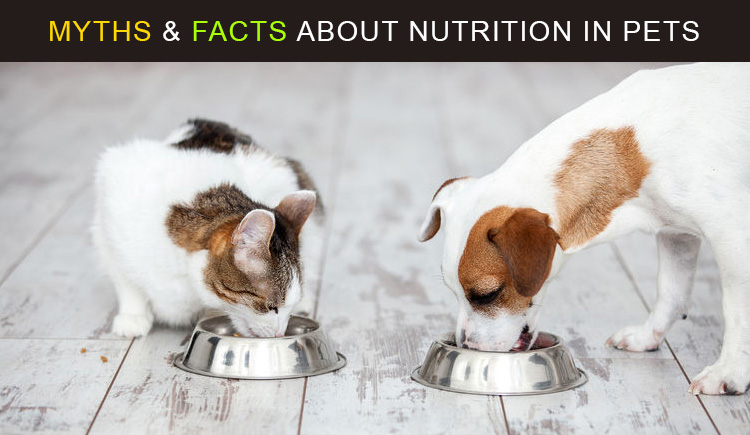You will find numerous articles on pet diet and nutrition. The real question is how much of that information is accurate? Nutrition is a key factor for living a healthy life but there are many myths surrounding it. The opinion of one nutrition expert might differ from another and that leads to confusion in pet parents. Moreover, it’s crucial that you rely on factual information when it comes to the health of your furry pal.
Myth 1 – Animals Shouldn’t Eat Food That Is High In Carbohydrate
Fact – It’s not about how much sugar your dog consumes, it’s about how he balances it out. If the dog is highly active, he will need carbohydrates and sugar to keep up with his energy levels. Highly glucose level is something your pet should steer clear off, but low glucose level can lead to hypoglycemia. Thus, carbohydrate intake entirely depends on the lifestyle and breed of the pet. Though, it’s always beneficial to play it safe and feed a moderate amount of sugar to your pooch.
Myth 2 – Plant-Based Food in High Quantity Reflects Low Digestibility
Fact – Every food item, be it plant-based or animal-based, has its benefits. Plant-based proteins could be comparatively less digestible, but dogs need a sufficient amount of amino acids which can be obtained by both plants and animal-based foods. When it comes to health and nutrition, both protein sources are beneficial for your furry pal’s health. Therefore, don’t worry if your pet’s food is not high on animal protein. As long as he’s getting sufficient amount of amino acids, there’s nothing to be concerned about.
Myth 3 – Cats Don’t Prefer To Eat Food That Tastes Sweet
Fact – The fact is, cats don’t have sweet taste receptors, so they can’t tell the difference when you feed her sweet food item. Moreover, many scientific discoveries reveal that cats and dogs are easily able to digest carbohydrates without any adverse effect on their digestive system. Therefore, it’s completely fine to feed sweets to your cat (as well as the dog) once in a while.
Myth 4 – Kibble Diet Is Not Sufficient; Adding Supplements Is Necessary
Fact – Many pet parents have this misconception that kibble diet doesn’t really provide necessary nutrients. Thus, they end up adding supplements to their pet’s diet. While it’s not harmful to include supplements, one should verify whether the dog needs it or not. Supplements are only required when the diet is not sufficient for the pet’s health. For the best and well-balanced diet for your pet, you can check out the range of pet foods offered by DiscountPetCare for both dogs and cats. You can opt for the best suitable pet food for your furry friend according to their taste buds and health requirement.
Myth 5 – Calcium Is Required For Growing Puppies
Fact – Calcium is extremely vital for the health of humans as well as animals. However, that doesn’t imply feeding more than required calcium based food. Pet parents make the mistake of feeding high-calcium diets to their puppies as they believe that growing animals require higher calcium. You’ll be surprised to learn that feeding a high amount of calcium can actually lead to skeletal diseases in pets. Therefore, researchers have come up with guidelines where it says that the calcium intake of large breed puppies should not exceed 1.8% on a dry matter basis.
When administering any type of pet food, it’s imperative to check the nutrients in the food rather than ingredients. Moreover, when pet food has all the necessary minerals and vitamins, adding supplements is not need. Though, if the food you’re giving to your pet lacks the same nutrients, you need to add supplements to their diet so it balances it out. At DiscountPetCare, we offer an exclusive range of branded Dietary Supplements for Dogs as well as Supplements for Cats.


